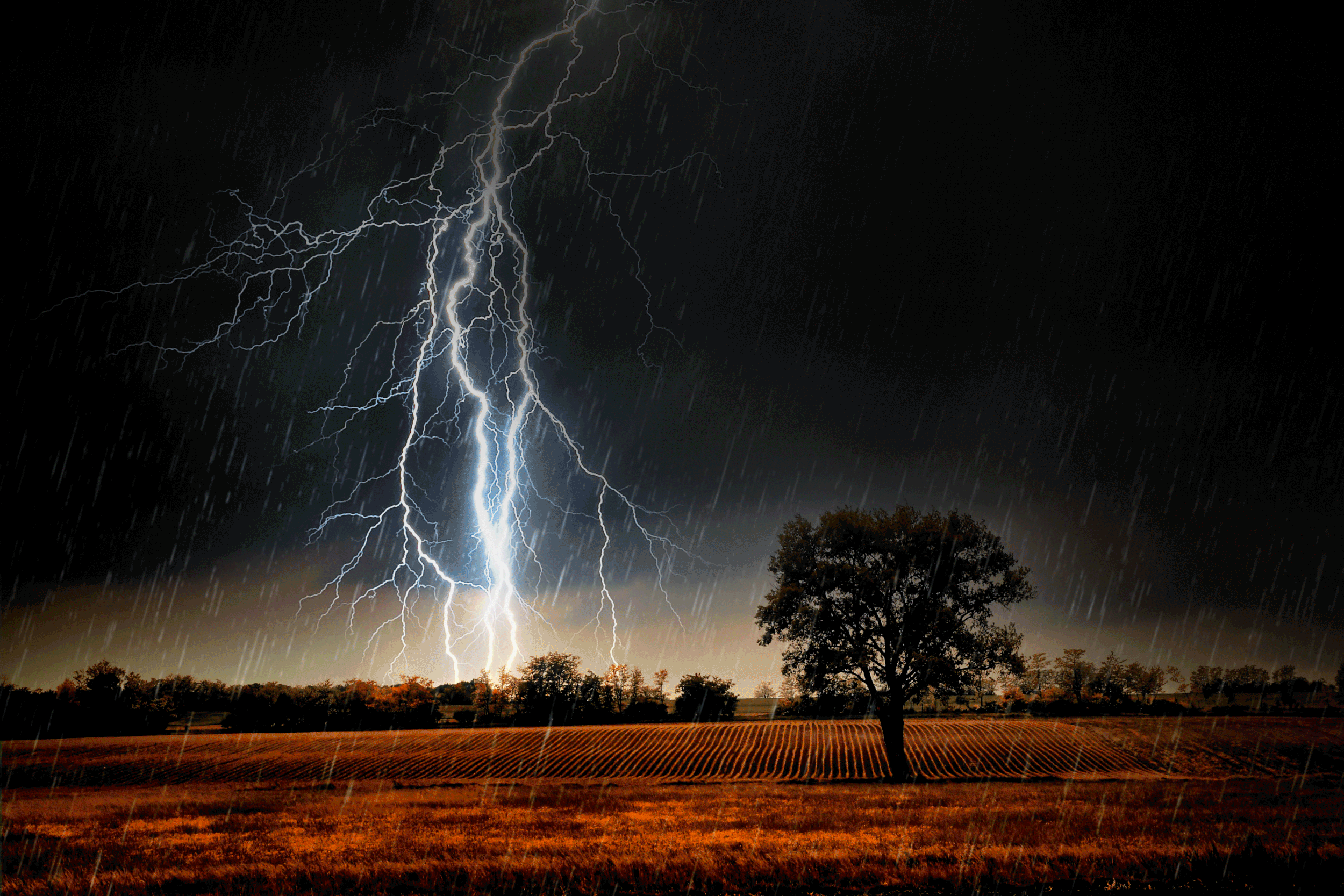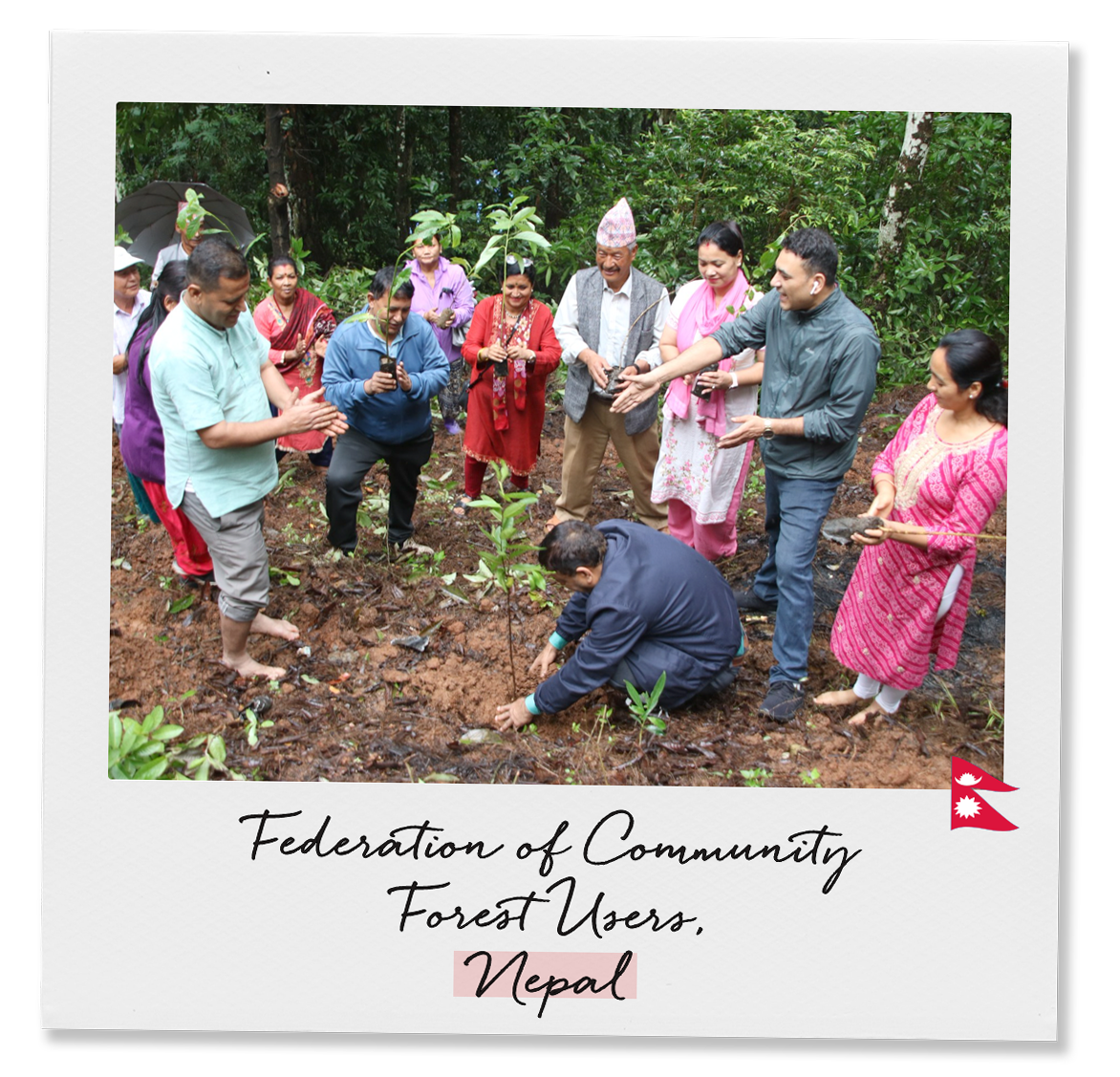2023
Let It Rain
Annual Report

Falling Rain
“We will fight to our last breath to ensure that the environment, the current and future generation are protected.”
– Sipiriano Nariva, The Landowners Committee Lomani Au Maroroi Au, Fiji
Thousand Currents has been at the forefront of supporting solutions for the ongoing climate crisis, economic injustice, and the food crisis for nearly 40 years. And this past year was a preview of two things—one, the intersecting inequitable crises we face aren’t going anywhere, and two, our movement partners are as determined as ever to meet this moment head-on.
Our movement partners across Africa, Asia and the Pacific, and Latin America and the Caribbean are all working to solve the most pressing issues of our time. They are responding to overlapping inequities through community-led stewardship of land, territory, agroecology, and renewable energy. They are challenging the status quo by disrupting false solutions and advocating for people-led solutions. And they are offering new propositions for how we imagine leadership, governance, and power.
To illustrate our work this past fiscal year, we are using rain as a symbol and guiding star. Rain binds together our core areas of work in climate, food, and economic justice. It is fundamental to all existence on our planet. Species thrive when they receive water from nature, humans need rainwater to sustain their daily lives, and Mother Earth needs rain’s constant touch to support the abundance of crops. As thousands of droplets create rain’s trajectory, we all share in the collective nourishment of rain’s essence.
We invite you to dive into our 2023 Annual Report.

A Torrential Force for Change: Our Partners
Stories of Patience
After nine years of litigation and community struggle led by our movement partner Bufete de Pueblos Indígenas in Guatemala, the Indigenous Mayan Ixil community from the Ixil triangle of Nebaj, Quiché, recovered 1,500 caballerías of land (67,500 hectares or approximately 166,800 acres). The return of this land led to a cease in the construction of buildings as well as hydroelectric plants, which would have destroyed rich water reservoirs and had detrimental impacts on the environment and the way of living of Ixil communities.
Almost a decade after pioneering a global campaign against deep sea mining alongside other Pacific movements and civil society groups, the advocacy work of Pacific Network on Globalization, one of our Fiji-based partners, contributed to a significant victory when French president Emmanuel Macron announced at COP27 that he supported a ban on deep sea mining in international waters. This followed Germany’s declaration of support for a precautionary pause on deep sea mining. The French parliament subsequently banned deep sea mining from French national waters, and the New Zealand government recently announced that it backs a conditional moratorium on deep sea mining in international waters.
Since 2019, Nous Sommes la Solution (NSS), a rural women farmers’ movement in West Africa, has been serving as a leading member of the steering committee of Dynamique de la Transition Agro-écologique au Sénégal (DyTAES). Set up to facilitate dialogue with the Senegalese government and develop a national agroecological transition policy, DyTAES is made up of farmers, breeders, fisherfolk, forest users, citizen consumers, community organizations, local authorities, nongovernmental organizations, researchers, and companies. Last year, DyTAES launched a nationwide consultation process involving many NGOs, peasant organizations, and local governments to focus on developing a proposal to scale up agroecology in Senegal.

Stories of Persistence
After years of hard work by Comité Central de Mujeres de la Unión de Organizaciones Campesinas e Indígenas de Cotacachi (CCMU-UNORCAC) in Ecuador, the Food and Agriculture Organization (FAO) recognized the Andean Chakra as an ancestral agroforestry system of the Kichwas communities in Cotacachi by certifying it as a Globally Important Agricultural Heritage Systems (GIAHS). Last year, over 300 participants took part in CCMU-UNORCAC's weekly workshops that promote women’s expertise, center Indigenous peasant women’s ancestry, and train attendees on agroecological practices for food production.
A five-year climate action lawsuit against the World Bank Group’s International Finance Corporation (IFC), spearheaded by our movement partner Philippines Movement for Climate Justice, led to accountability mechanisms that will end coal investments by the IFC. The IFC will require that financial institutions in which it has equity begin phasing out coal sector financing immediately, and bring their coal exposure to zero by 2030.
Despite increased suppression, our partner Witness Radio supported more than 1 million people (representing over 150,000 homes) in Uganda with strategic litigation to stop forced evictions of smallholder farmers and Indigenous families. In addition to monitoring land development projects and contributing to climate mitigation and to biodiversity and landscape conservation, Witness Radio continues to work on cases involving over 500,000 Indigenous people affected by controversial leasing of land in midwestern Uganda.

Stories of Promise
Climate justice activists in South Africa sailed into 2022 with a substantial win against the oil giant Shell. Shell’s plans to begin exploring for oil and gas in the Indian Ocean off of KwaZulu-Natal’s Wild Coast were halted after frontline coastal communities took the multinational corporation to the High Court, which sided with them in a landmark victory. This win was made possible by a coalition of organizations led by our movement partner Amadiba Crisis Committee.
This past year, Movimento dos Trabalhadores Rurais Sem Terra (MST), a movement in Brazil made up of 1.5 million rural, poor, and landless peasants fighting for agrarian reform, entered its 39th year. Their vast work expanded to 24 of Brazil’s 27 states, representing five regions in the country. In reclaiming 17 million acres of land, more than 350,000 rural families and many more in surrounding urban communities have been fed—making MST the largest producer of organic rice in Brazil. In addition to contributing to communities’ food needs, the rice is exported and sent to public schools so that young people have more access to organic food.
Nepal’s government expanded community-managed forestry to cover 60% of all forest land by 2030 and simultaneously increased the number of Community Forest User Groups—autonomous local community institutions—from 638 to 22,519 (comprising 55% of the population). Federation of Community Forest Users in Nepal’s work played an instrumental role in these achievements, which also included a call to support gender equity by appointing 22,000 women to community leadership roles.
The High Court in Nairobi, Kenya, stopped the importation, distribution, open cultivation, and consumption of GMO crops and foods until the case that was filed by the Kenyan Peasants League is heard and determined, marking a victory for smallholder farmers in the country. Their tactics included public awareness campaigns, education, and direct action to mobilize farmers and consumers, as well as litigation to obtain stay orders to reverse the government’s action.

Our Growth
In fiscal year 2023, Thousand Currents nurtured relationships with 107 movement partners in 42 countries—including 11 new countries—across 8 subregions around the world, with 16 new catalyst partners and 12 new long-term thematic partners.
107
movement partners in
42 countries
We sent 139 grants last year, totaling more than $9.5 million—our highest grant amount ever!
139 grants
totaling
$9,500,000+
The CLIMA Fund, a collaboration between Global Greengrants Fund, Grassroots International, Thousand Currents, and Urgent Action Fund for Feminist Activism, awarded 271 grants to grassroots groups in 68 countries.
CLIMA’s budget grew from
$5 million to
$15 million
In the past fiscal year, we:
Raised $7.3 million
from foundations
$3.9 million
Brought in
99.8%
from individuals
of which is unrestricted
Celebrated that
74% of our individual donors
came back from prior years

Our Changes
After ten years, Africans in the Diaspora (AiD), our donor education initiative housed within the Africa program, ended its journey. We are proud of the learnings that AiD provided us on how to be in better solidarity with Africans, Afro-descendants, and Black people. AiD’s parting gift, a magazine entitled “Speaking Back, Speaking Black,” remains accessible as an amplification of African voices in philanthropy that move, shake, and shift.
We also ended our experiment on impact investing by sunsetting another project: the Buen Vivir Fund, a powerful exercise in co-creation, collaboration, and power sharing. We are grateful for all that we built through this eight-year journey and seek strength from the lessons we learned during this time.

Our Financials
In the past year, we expanded our staff, capacity, and systems in order to be ready to move unprecedented resources in the coming years. Eighty-eight percent of Thousand Currents’ staff identify as Black, Indigenous, multiracial, or a person of color, and a third are from and based out of the Global South. Collectively, we are conversant in over 20 languages and represent 14 countries.
We are proud to have contributed to this fiscal year 2023’s financial snapshot:
Income
Foundations (89%)
Contributions (8%)
Other (3%)
Expenses
Fundraising (9%)
Program (84%)
Management and General Expenses (7%)
Our 2022 figures include fiscal sponsorship for The CLIMA Fund.

Come Rain or Come Shine
Collective problems require collective solutions. At this pivotal moment in history—where the choices we make can either accelerate a spiraling climate and ecological crisis or restore a more symbiotic relationship between humanity and nature—our movement partners showed up big. Last year, they worked to end our reliance on fossil fuels and agrotoxins, advance agroecology and Indigenous land stewardship, and accelerate renewable energy transitions.
Over the next decade, Thousand Currents is planning to move an unprecedented $250 million to frontline grassroots organizations and social movements. We believe that movements are the key to our collective future, just as they have been to every transformational change in society. Your support shows that you do too.
Our work is only possible because of donors like you, and we thank you for your continued commitment. Together, we can halt the growing crises around food, climate, and economy and build a more just future.
In solidarity,
Solomé Lemma
Executive Director
Shilpa Alimchandani
Board Chair

Our Gratitude
Our deepest gratitude to our board members and staff. We are a community of 40+ people who work collectively toward realizing our mission.
We are grateful to our vibrant donors, who believe that together we can build a world of food sovereignty, economic justice, and climate justice. A special shoutout to:
129* donors who gave to Thousand Currents for the first time
42 donors who gave as a result of our Giving Circle members’ fundraising efforts
(*including Giving Circle members themselves)
31 institutional funders
We are deeply nourished by our movement partners and thank them for trusting us with the stories, photographs, and narratives that appear in this report. We learn from you every day.
“We are working to create a new society based on human rights, indivisible and interrelated.”
— David Otieno, Kenyan Peasants League



















